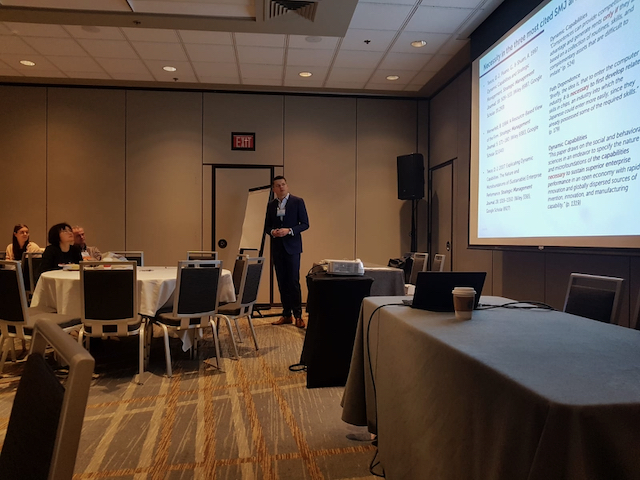Call for Papers: Using Necessary Condition Analysis (NCA) to Advance Strategy, Innovation, and Entrepreneurship Research
We are editing a virtual special issue in the Journal of Business Research dedicated to the application of Necessary Condition Analysis in strategy, innovation and entrepreneurship research.


January 16, 2024
The call for papers for our special issue on Necessary Condition Analysis (NCA) in the Journal of Business Research is now online! We invite submissions that apply NCA in strategy, innovation, and entrepreneurship research. The editorial team—Patrycja Klimas, professor Ricarda Bouncken, professor Jan Dul, and myself as the executive guest editor—will support you with publishing an impactful, relevant, and high-quality NCA paper. The submission window opens one year from now, on January 1, 2025. We are looking forward to your submissions!
Motivation for the Special Issue
Different conceptualizations of organizational performance and their antecedents have served as key variables for studies in the fields of strategic management, innovation, and entrepreneurship. For example, sustained competitive advantage has been coined as the central performance variable of the resource-based view of the firm (RBV), which depends on a set of antecedents, such as that firm resources have to be valuable (Barney, 1991). Many studies in the realm of innovation management argue that knowledge breadth and knowledge overlap are necessary conditions for knowledge integration in the innovation process (e.g., Vakili & Kaplan, 2021). Furthermore, the literature on entrepreneurship has suggested many necessary conditions for firm emergence, including the preparation of a business plan, the acquisition of outside funding, or the start of marketing and promotion activities (Arenius et al., 2017). Together, these literatures study which factors—for example, key success factors or profit drivers—enable large and small organizations to achieve their goals. At the same time, they also identify factors that are bottlenecks for success. For example, the RBV argues that a competitive advantage cannot be achieved without valuable, rare, inimitable and substitutable resources (Barney, 1991). Such “necessities” or “must-haves” have been stated in other fields, too: without trust in a buyer-supplier relationship, it is impossible to achieve high levels of collaborative innovation (Van der Valk et al., 2016). Without high levels of motivational cultural intelligence, it is impossible for global virtual teams to achieve high levels of social integration and performance (Richter et al., 2021).
Questions about necessities and “must-haves” can be especially addressed with Necessary Condition Analysis (NCA). NCA offers a fresh look at important phenomena and can further advance our understanding of causal relationships (Aguinis et al., 2020; Bokrantz & Dul, 2022; Dul, 2016). Necessary conditions are enablers that must be present for an outcome to occur (Dul, 2016). They often work as bottlenecks, constraints, or barriers: their absence prevents an organization, team, or individual from achieving their goals. While regression-based techniques help us understand which factors on average and ceteris paribus contribute to important organizational outcomes, NCA helps us to separate the need-to-haves from the nice-to-haves. The insights provided by NCA are, therefore, not only theoretically but also practically relevant to researchers, executives, managers, and policymakers. However, despite the ubiquity of necessary condition statements in strategy, innovation, and entrepreneurship research, thorough descriptions of the mechanisms of necessity statements and strong empirical tests are still scarce. NCA offers a methodological and theoretical toolkit to theorize and test necessary condition hypotheses. The aim of the special issue is to invite submissions that use NCA to theoretically and empirically advance strategy, innovation, and entrepreneurship research.
The special issue is a timely one because there is a need for best-practice examples of NCA studies. With the increasing popularity of NCA across many scholarly fields—including entrepreneurship, human resource management, international business, marketing, operations, public and non-profit management, strategic management, and tourism—comes a variety of methodological applications and interpretations. The establishment of best practices—such as those described by Dul, Hauff and Bouncken (2023)—is necessary to move the management field forward. The editors of this special issue are committed to supporting authors with the implementation of theoretical and empirical best practices. A second reason is that the special issue will offer strategy, innovation, and entrepreneurship scholars with a fresh perspective on both new and old phenomena. To explain the relationship between a necessary condition and its outcome, scholars need to use a different type of logic (Bokrantz & Dul, 2022). Developing this logic and incorporating them into established management theories has the opportunity to move the field forward (Aguinis et al., 2020). This special issue will be the first journal issue dedicated to novel perspectives offered by NCA and its underlying logic.
Suggested Themes
The special issue focuses on studies within the strategic management, innovation, and entrepreneurship literatures that consider necessary conditions, bottlenecks, or constraints for important organizational outcomes. These outcomes include—but are not limited to—firm performance, strategic change, sustainability, intrapreneurship, knowledge recombination, new product or service development, venture funding, new venture creation, and new venture success. Example research questions are:
- Why and how do efficiency and resource scarcity constrain organization’s ability for innovation and growth?
- What are the necessary conditions for successful relational strategies—including alliances, industry clusters, business ecosystems, and strategic networks?
- What are the bottlenecks preventing organizations from developing sustainable (environmental, social, and economic) business models?
- What are the necessary conditions for successfully responding to disruptive technologies such as Artificial Intelligence (AI) and the deluge of available data?
- How can organizations identify and manage the barriers to bottom-up innovation?
- What are the necessary conditions for moving from one stage of the innovation process to the next?
- Considering all the researched factors influencing the innovation process, which of them are need-to-haves and which are nice-to-haves?
- How do start-up ecosystems influence the conditions necessary to start a successful company?
- Why are some founder characteristics necessary for firm emergence while others are not?
- Considering the journey from idea to start-up, what are the bottlenecks preventing entrepreneurs from realizing their ideas?
Manuscript Types
- Standalone NCA studies. These studies use NCA as the only empirical method to test hypotheses.
- Multimethod studies combining NCA and Structural Equation Modeling (SEM). These studies use SEM to estimate latent variable scores and use these scores as input for NCA.
- Multimethod studies combining NCA and Linear Regression Analysis. These studies use NCA to complement a linear regression analysis with additional insights.
- Multimethod studies in which NCA is combined with Qualitative Comparative Analysis (QCA). These studies use NCA for the analysis of necessity, and QCA for the analysis of sufficiency.
- Conceptual studies. These studies use necessity logic to develop necessity propositions or alter existing theoretical models.
Manuscript Submission Information
Submissions are welcomed starting: October 1, 2024
Paper Submission Deadline: January 31, 2025
If you’d like to submit to this special issue, you can do it here.
Please make sure you select the Article Type ‘VSI: Must-have or nice-to-have’ when submitting your paper.
All submissions will go through the JBR regular double-blind review process and follow the standard norms and processes.
References
Aguinis, H., Ramani, R. S., & Cascio, W. F. (2020). Methodological practices in international business research: An after-action review of challenges and solutions. Journal of International Business Studies. https://doi.org/10.1057/s41267-020-00353-7
Arenius, P., Engel, Y., & Klyver, K. (2017). No particular action needed? A necessary condition analysis of gestation activities and firm emergence. Journal of Business Venturing Insights, 8, 87–92. https://doi.org/10.1016/j.jbvi.2017.07.004
Barney, J. (1991). Firm resources and sustained competitive advantage. Journal of Management, 17(1), 99–120. https://doi.org/10.1177/014920639101700108
Bokrantz, J., & Dul, J. (2022). Building and testing necessity theories in supply chain management. Journal of Supply Chain Management, jscm.12287. https://doi.org/10.1111/jscm.12287
Dul, J. (2016). Necessary condition analysis (NCA): Logic and methodology of “necessary but not sufficient” causality. Organizational Research Methods, 19(1), 10–52. https://doi.org/10.1177/1094428115584005
Dul, J., Hauff, S., & Bouncken, R. B. (2023). Necessary condition analysis (NCA): Review of research topics and guidelines for good practice. Review of Managerial Science, 17(2), 683–714. https://doi.org/10.1007/s11846-023-00628-x
Fredrich, V., Bouncken, R. B., & Kraus, S. (2019). The race is on: Configurations of absorptive capacity, interdependence and slack resources for interorganizational learning in coopetition alliances. Journal of Business Research, 101, 862–868. https://doi.org/10.1016/j.jbusres.2018.11.038
Frommeyer, B., Wagner, E., Hossiep, C. R., & Schewe, G. (2022). The utility of intention as a proxy for sustainable buying behavior – A necessary condition analysis. Journal of Business Research, 143, 201–213. https://doi.org/10/gpddpz
Hernández-Perlines, F., Moreno-García, J., & Yañez-Araque, B. (2016). The mediating role of competitive strategy in international entrepreneurial orientation. Journal of Business Research, 69(11), 5383–5389. https://doi.org/10.1016/j.jbusres.2016.04.142
Leischnig, A., Kasper-Brauer, K., & Thornton, S. C. (2018). Spotlight on customization: An analysis of necessity and sufficiency in services. Journal of Business Research, 89, 385–390. https://doi.org/10.1016/j.jbusres.2017.12.038
Richter, N. F., & Hauff, S. (2022). Necessary conditions in international business research – advancing the field with a new perspective on causality and data analysis. Journal of World Business, 57(5), 101310. https://doi.org/10/gpcbr7
Richter, N. F., Martin, J., Hansen, S. V., Taras, V., & Alon, I. (2021). Motivational configurations of cultural intelligence, social integration, and performance in global virtual teams. Journal of Business Research, 129, 351–367. https://doi.org/10.1016/j.jbusres.2021.03.012
Torres, P., Augusto, M., & Godinho, P. (2017). Predicting high consumer-brand identification and high repurchase: Necessary and sufficient conditions. Journal of Business Research, 79, 52–65. https://doi.org/10.1016/j.jbusres.2017.05.029
Vakili, K., & Kaplan, S. (2021). Organizing for innovation: A contingency view on innovative team configuration. Strategic Management Journal, 42(6), 1159–1183. https://doi.org/10.1002/smj.3264
Van der Valk, W., Sumo, R., Dul, J., & Schroeder, R. G. (2016). When are contracts and trust necessary for innovation in buyer-supplier relationships? A necessary condition analysis. Journal of Purchasing and Supply Management, 22(4), 266–277. https://doi.org/10.1016/j.pursup.2016.06.005
Related Posts

Service Workshops
This workshop provides an introduction to Necessary Condition Analysis (NCA) for strategic management research

Research Talks

Service Workshops
In this workshop, you will learn about the core concepts of Necessary Condition Analysis (NCA) and the latest developments of this increasingly popular research method.

Research Talks
A presentation of a study showing that closed networks serve as social straitjackets that prevent employees from achieving high levels of innovative performance.